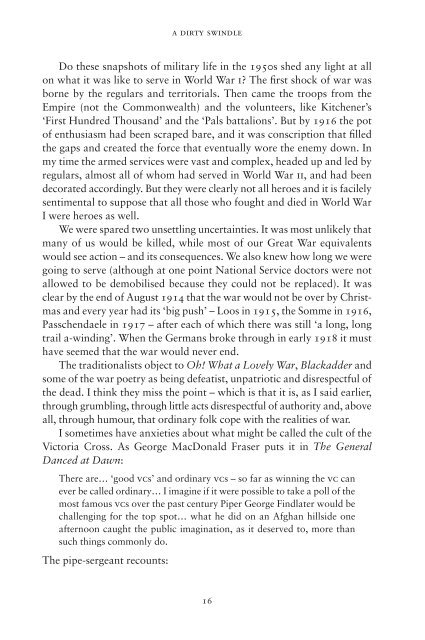A Dirty Swindle by Walter Stephen sampler
Walter Stephen provides an uninhibited look at the misery and toil of World War I through a collection of twelve stories. Providing a Scottish perspective, he takes a look at reports from home and abroad with scepticism, delving deeper to unveil the unencumbered truth. Recalling Siegfried Sassoon’s words, Stephen reveals the failures of those in command as the Great War became known as A Dirty Swindle. The varied accounts chronicle the progress of troops from recruitment to training to the frontline, as well as revealing a side of Field Marshal Haig never seen before.
Walter Stephen provides an uninhibited look at the misery and toil of World War I through a collection of twelve stories. Providing a Scottish perspective, he takes a look at reports from home and abroad with scepticism, delving deeper to unveil the unencumbered truth.
Recalling Siegfried Sassoon’s words, Stephen reveals the failures of those in command as the Great War became known as A Dirty Swindle. The varied accounts chronicle the progress of troops from recruitment to training to the frontline, as well as revealing a side of Field Marshal Haig never seen before.
Create successful ePaper yourself
Turn your PDF publications into a flip-book with our unique Google optimized e-Paper software.
a dirty swindle<br />
Do these snapshots of military life in the 1950s shed any light at all<br />
on what it was like to serve in World War i? The first shock of war was<br />
borne <strong>by</strong> the regulars and territorials. Then came the troops from the<br />
Empire (not the Commonwealth) and the volunteers, like Kitchener’s<br />
‘First Hundred Thousand’ and the ‘Pals battalions’. But <strong>by</strong> 1916 the pot<br />
of enthusiasm had been scraped bare, and it was conscription that filled<br />
the gaps and created the force that eventually wore the enemy down. In<br />
my time the armed services were vast and complex, headed up and led <strong>by</strong><br />
regulars, almost all of whom had served in World War ii, and had been<br />
decorated accordingly. But they were clearly not all heroes and it is facilely<br />
sentimental to suppose that all those who fought and died in World War<br />
I were heroes as well.<br />
We were spared two unsettling uncertainties. It was most unlikely that<br />
many of us would be killed, while most of our Great War equivalents<br />
would see action – and its consequences. We also knew how long we were<br />
going to serve (although at one point National Service doctors were not<br />
allowed to be demobilised because they could not be replaced). It was<br />
clear <strong>by</strong> the end of August 1914 that the war would not be over <strong>by</strong> Christmas<br />
and every year had its ‘big push’ – Loos in 1915, the Somme in 1916,<br />
Passchendaele in 1917 – after each of which there was still ‘a long, long<br />
trail a-winding’. When the Germans broke through in early 1918 it must<br />
have seemed that the war would never end.<br />
The traditionalists object to Oh! What a Lovely War, Blackadder and<br />
some of the war poetry as being defeatist, unpatriotic and disrespectful of<br />
the dead. I think they miss the point – which is that it is, as I said earlier,<br />
through grumbling, through little acts disrespectful of authority and, above<br />
all, through humour, that ordinary folk cope with the realities of war.<br />
I sometimes have anxieties about what might be called the cult of the<br />
Victoria Cross. As George MacDonald Fraser puts it in The General<br />
Danced at Dawn:<br />
There are… ‘good vcs’ and ordinary vcs – so far as winning the vc can<br />
ever be called ordinary… I imagine if it were possible to take a poll of the<br />
most famous vcs over the past century Piper George Findlater would be<br />
challenging for the top spot… what he did on an Afghan hillside one<br />
afternoon caught the public imagination, as it deserved to, more than<br />
such things commonly do.<br />
The pipe-sergeant recounts:<br />
16


















